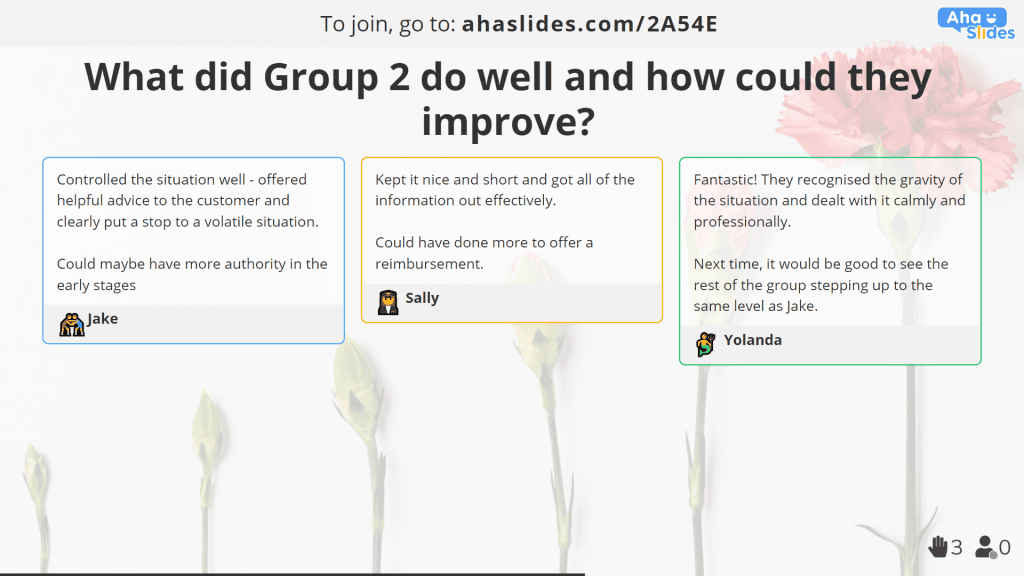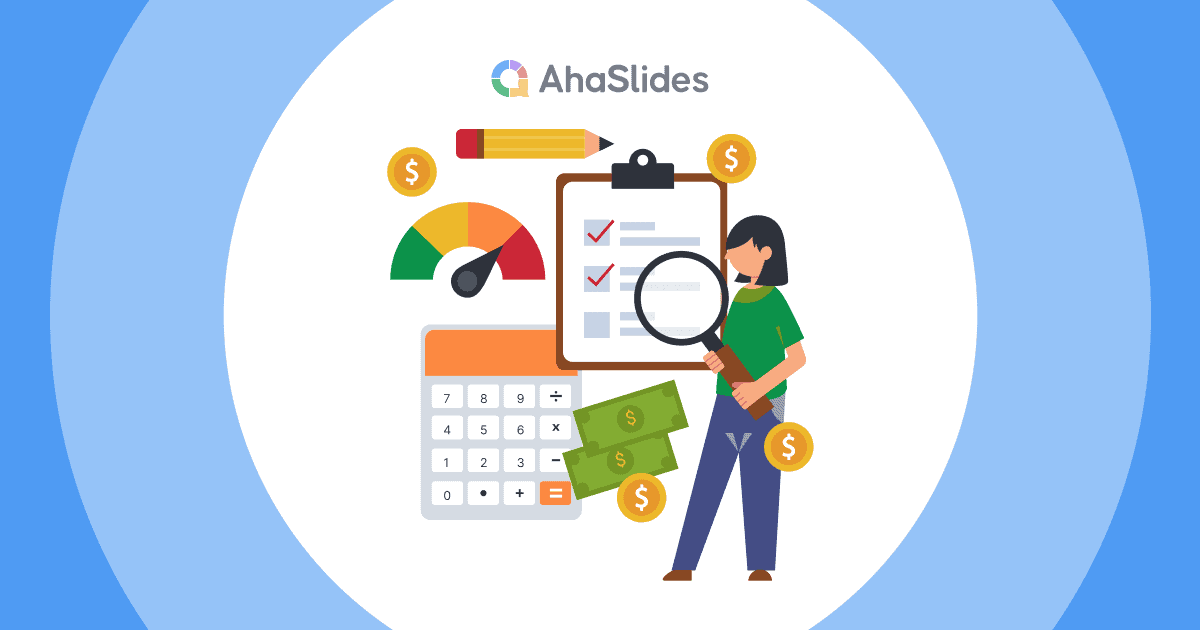Inteligencja umysłowa vs Inteligencja emocjonalna w przywództwie? Co jest ważniejsze dla świetnego lidera? Sprawdź AhaSlides Best Guide w 2024 r.
Odbył się kontrowersyjny spór na temat tego, czy przywódcy o wysokiej inteligencji emocjonalnej są lepsi w przywództwie i zarządzaniu niż przywódcy o wysokiej inteligencji umysłowej.
Biorąc pod uwagę, że wielu wspaniałych liderów na świecie ma wysokie IQ, nie gwarantuje to, że posiadanie IQ bez EQ przyczynia się do udanego przywództwa. Zrozumienie istoty inteligencji emocjonalnej w przywództwie może pomóc zespołowi zarządzającemu dokonywać właściwych wyborów i podejmować właściwe decyzje.
Artykuł nie tylko skupi się na wyjaśnieniu pojęcia inteligencji emocjonalnej, ale także pójdzie dalej, aby poznać głęboki wgląd w rolę inteligencji emocjonalnej w przywództwie i jak ćwiczyć tę umiejętność.
Przegląd
| Kto wynalazł „inteligencję emocjonalną”? | dr Daniel Goleman |
| Kiedy wynaleziono „inteligencję emocjonalną”? | 1995 |
| Kto jako pierwszy użył terminu „inteligencja emocjonalna”? | John D. Mayer z UNH i Peter Salovey z Yale |
Spis treści
- Czym jest inteligencja emocjonalna?
- W których umiejętnościach inteligencji emocjonalnej jesteś dobry?
- Dlaczego inteligencja emocjonalna jest tak ważna w przywództwie?
- Jak ćwiczyć inteligencję emocjonalną w przywództwie?
- Na wynos
- Najczęściej zadawane pytania

Więcej wskazówek dotyczących AhaSlides
- Ocena wydajności pracowników
- Zarządzanie czasem
- Przykłady stylu przywództwa
- Wizjonerskie przywództwo
- Umiejętności strategicznego myślenia

Szukasz narzędzia do zaangażowania swojego zespołu?
Zbierz członków swojego zespołu w zabawnym quizie na AhaSlides. Zarejestruj się, aby wziąć udział w darmowym quizie z biblioteki szablonów AhaSlides!
🚀 Weź darmowy quiz☁️
Czym jest inteligencja emocjonalna?
Pojęcie inteligencji emocjonalnej rozpowszechniło się m.in Daniel Goleman w latach 1990., ale po raz pierwszy pojawił się w artykule Michaela Beldocha z 1964 r., który wskazuje, że ktoś ma zdolność postrzegania i monitorowania własnych emocji oraz emocji innych osób oraz wykorzystuje je do kierowania myśleniem i zachowaniem innych.
Przykłady inteligentnych emocjonalnie liderów
- Wyrażanie otwartości, szacunku, ciekawości i aktywnego słuchania historii i uczuć innych bez obawy, że ich urazimy
- Rozwijanie zbiorowego poczucia celów i strategicznego planu ich osiągnięcia
- Branie odpowiedzialności za swoje czyny i błędy
- Generowanie i zachęcanie do entuzjazmu, pewności i optymizmu, a także budowanie zaufania i współpracy
- Oferowanie wielu perspektyw w celu motywowania zmian i innowacji organizacji
- Budowanie spójności kultury organizacyjnej
- Wiedza, jak kontrolować swoje uczucia, zwłaszcza złość lub rozczarowanie
W jakich umiejętnościach związanych z inteligencją emocjonalną jesteś dobry?
Przedstawiając artykuł „Co czyni lidera”, Daniel Goleman zdefiniował inteligencję emocjonalną w przywództwie z 5 elementami jasno wyjaśnionymi w następujący sposób:
# 1. Samoświadomość
Bycie świadomym swoich uczuć i ich przyczyn jest pierwszym krokiem, zanim zaczniesz dostrzegać emocje innych. Chodzi również o twoją zdolność do zrozumienia swoich mocnych i słabych stron. Kiedy jesteś na stanowisku kierowniczym, powinieneś wiedzieć, które z twoich emocji będą miały pozytywny lub negatywny wpływ na twoich pracowników.
#2. Samoregulacja
Samoregulacja polega na kontrolowaniu i dostosowywaniu emocji do zmieniających się okoliczności. Obejmuje ona zdolność do wychodzenia z przygnębienia i niezadowolenia, aby działać w sposób zgodny z własnymi wartościami. Lider nie potrafi odpowiednio kontrolować gniewu lub wściekłości i nie może zagwarantować skuteczności zespołu. Bardziej boją się robić złe rzeczy niż są zmotywowani do robienia tego, co dobre. To dwie zupełnie różne historie.
#3. Empatia
Niewielu liderów potrafi wczuć się w sytuację innych, zwłaszcza podczas podejmowania decyzji, ponieważ muszą oni stawiać realizację zadań i cele organizacji na pierwszym miejscu. Emocjonalnie inteligentny lider jest rozważny i rozważny w stosunku do wszelkich podejmowanych działań i decyzji, aby upewnić się, że nikt w jego zespole nie zostanie pominięty lub nie dojdzie do niesprawiedliwego problemu.
#4. Motywacja
John Hancock powiedział: „Największą umiejętnością w biznesie jest dogadywanie się z innymi i wpływanie na ich działania”. Ale jak dogadywać się i wpływać na nich? Motywacja jest rdzeniem inteligencji emocjonalnej w przywództwie. Chodzi o silne pragnienie osiągnięcia niejednoznacznych, ale realistycznych celów nie tylko dla siebie, ale także zachęcania podwładnych do przyłączenia się do nich. Lider musi zrozumieć, co motywuje pracowników.
#5. Umiejętności społeczne
Umiejętności społeczne dotyczą radzenia sobie z innymi, innymi słowy, zarządzania relacjami. Wydaje się tak prawdziwe, że „Kiedy masz do czynienia z ludźmi, pamiętaj, że nie masz do czynienia z istotami logiki, ale z istotami emocji”, powiedział Dale Carnegie. Umiejętności społeczne mają silny związek z dobrymi komunikatorami. I zawsze są najlepszym przykładem zachowania i dyscypliny, które członkowie zespołu powinni naśladować.

Dlaczego inteligencja emocjonalna w przywództwie jest tak ważna?
Rola inteligencji emocjonalnej w przywództwie jest niezaprzeczalna. Wydaje się, że nadszedł właściwy czas, aby liderzy i menedżerowie wykorzystali inteligencję emocjonalną do skutecznego przywództwa. Nie ma już ery stosowania kar i władzy, aby zmusić innych do przestrzegania twoich rządów, zwłaszcza w przywództwie biznesowym, szkoleniach edukacyjnych, branży usługowej i nie tylko.
W historii istnieje wiele idealnych modeli inteligentnego emocjonalnie przywództwa, które wywarły silny wpływ na miliony ludzi i próbowały stworzyć lepszy świat, jak Martin Luther King Jr.
Jest znany z tego, że wykazuje wysoki poziom inteligencji emocjonalnej, aby motywować i inspirować ludzi do przyłączenia się do niego poprzez stawanie w obronie tego, co słuszne i równości. Jako jeden z najbardziej typowych przykładów inteligencji emocjonalnej w przywództwie, Martin Luther King nawiązał kontakt ze swoimi słuchaczami, dzieląc te same wartości i wizję przyszłości ze swoimi najbardziej autentycznymi uczuciami i przekazując współczucie.
Ciemna strona inteligencji emocjonalnej w przywództwie odnosi się do jej wykorzystania jako techniki manipulowania myśleniem ludzi lub wywoływania negatywnych emocji w celu realizacji szkodliwych celów, o czym wspomina również Adam Grant w swojej książce. Będzie to miecz obosieczny, jeśli nie użyjesz jej właściwie.
Jednym z najbardziej ikonicznych negatywnych przykładów wykorzystania inteligencji emocjonalnej w przywództwie jest Adolf Hitler. Szybko zdając sobie sprawę z mocy inteligencji emocjonalnej, przekonywał ludzi, strategicznie wyrażając emocje, co doprowadziło do kultu jednostki, a w rezultacie jego zwolennicy „przestali myśleć krytycznie i po prostu wyrażali emocje”.
Jak ćwiczyć inteligencję emocjonalną w przywództwie?
W książce Primal leadership: The Hidden Driver of Great Performance autorzy podzielili style przywództwa emocjonalnego na sześć kategorii: Authoritative (autorytatywny), Coaching (coachingowy), Affiliative (afiliacyjny), Democratic (demokratyczny), Pacesetting (ustalający tempo) i Coercive (przymusowy) (Daniel Goleman, Richard Boyatzis i Annie McKee, 2001). Wybierając style przywództwa emocjonalnego, należy zachować ostrożność, ponieważ nie wiadomo, jak duży wpływ każdy styl ma na nastrój i intuicję osób, którym przewodzimy.
Oto 5 sposobów na ćwiczenie inteligencji emocjonalnej w przywództwie:
# 1. Ćwicz uważność
Bądź świadomy tego, co mówisz i używasz słów. Ćwiczenie myślenia w najbardziej uważny i przemyślany sposób może pomóc w radzeniu sobie z własnymi emocjami i reagowaniu na nie. Pomaga również zmniejszyć negatywne uczucia i zmniejsza prawdopodobieństwo wypalenia lub przytłoczenia. Możesz poświęcić czas na pisanie dziennika lub refleksję nad swoją aktywnością pod koniec dnia.
#2. Zaakceptuj i ucz się na podstawie opinii
Możesz spróbować zaskakującej sesji kawowej lub przekąskowej, aby mieć czas na rozmowę i wysłuchanie swoich pracowników, co może wspierać więź emocjonalną. Możesz również przeprowadzić ankietę, aby dowiedzieć się, czego naprawdę potrzebują Twoi pracownicy i co może ich motywować. Po tego rodzaju głębokiej rozmowie i ankiecie można uzyskać wiele cennych informacji. Jak widać na przykładzie znanych liderów o wysokiej inteligencji emocjonalnej, uczciwe i wysokiej jakości wypowiedzi to najlepsze sposoby na uzyskanie informacji zwrotnej od zespołu. Akceptuj to, co mówi informacja zwrotna, niezależnie od tego, czy jest pozytywna, czy negatywna, i ćwicz powstrzymywanie urazy lub podekscytowania, gdy widzisz tę informację zwrotną. Nie pozwól, aby wpłynęła na Twoją decyzję.

#3. Dowiedz się o językach ciała
Nigdy nie jest bezużyteczne, jeśli zainwestujesz swój czas i wysiłek w naukę głębokiego wglądu w świat mowy ciała. Nie ma lepszego sposobu na rozpoznanie innych nastrojów niż patrzenie na ich mowę ciała. Konkretne gesty, ton głosu i kontrola wzroku, … mogą ujawnić ich prawdziwe myśli i uczucia. Nigdy nieignorowanie żadnego szczegółu w ich działaniach może pomóc ci lepiej odgadnąć prawdziwe emocje i szybko i odpowiednio na nie zareagować.
#4. Dowiedz się o korzyściach i karach
Jeśli zastanawiasz się, jaki rodzaj korzyści lub kary lepiej działa na motywację pracowników, pamiętaj, że złapiesz więcej much na miód niż na ocet. Prawdą jest, że wielu pracowników uwielbia słyszeć pochwały od swojego przełożonego, gdy wykonują świetną pracę lub osiągają sukcesy i będą nadal osiągać lepsze wyniki.
Mówi się, że około 58% sukcesu w pracy opiera się na inteligencji emocjonalnej. W niektórych przypadkach kara jest potrzebna, zwłaszcza gdy chce się zachować równość i zaufanie oraz zapobiegać konfliktom.
#5. Weź udział w kursie lub szkoleniu online
Nigdy nie będziesz wiedział, jak go rozwiązać, jeśli nigdy go nie spotkasz. Konieczne jest dołączenie do szkoleń lub kursów dotyczących doskonalenia inteligencji emocjonalnej. Możesz rozważyć szkolenie, które daje szansę na zaangażowanie pracowników i przećwiczenie elastycznych scenariuszy. Podczas szkoleń możesz także poznać różne sposoby rozwiązywania konfliktów.
Ponadto możesz zaprojektować kompleksowe szkolenie z inteligencji emocjonalnej dla swojego pracownika z różnymi działaniami budującymi zespół, aby pielęgnować empatię i promować lepsze zrozumienie innych. Dzięki temu masz szansę obserwować ich działania, postawy i zachowania podczas gry.
Na wynos
Więc jakim liderem chcesz być? Zasadniczo nie ma idealnego dobra lub zła w używaniu inteligencji emocjonalnej w przywództwie, ponieważ większość rzeczy działa jak dwie strony tej samej monety. W dążeniu do celów zarówno krótkoterminowych, jak i długoterminowych liderzy powinni rozważyć wyposażenie się w umiejętności inteligencji emocjonalnej.
Bez względu na to, jaki styl przywództwa wybierzesz, AhaSlajdy odpowiednio najlepsze narzędzia edukacyjne i szkoleniowe, które pomogą liderom w szkoleniu i angażowaniu pracowników w celu zwiększenia efektywności i spójności zespołu. Próbować AhaSlajdy natychmiast, aby zwiększyć wydajność swojego zespołu.
Najczęściej zadawane pytania
Czym jest inteligencja emocjonalna?
Inteligencja emocjonalna (EI) odnosi się do zdolności rozpoznawania, rozumienia i zarządzania własnymi emocjami, a także skutecznego nawigowania i reagowania na emocje innych. Obejmuje zestaw umiejętności związanych ze świadomością emocjonalną, empatią, samoregulacją i interakcją społeczną. Dlatego jest to niezwykle ważna umiejętność na stanowisku kierowniczym.
Ile jest rodzajów inteligencji emocjonalnej?
Istnieje pięć różnych kategorii: motywacja wewnętrzna, samoregulacja, samoświadomość, empatia i świadomość społeczna.
Jakie są 3 poziomy inteligencji emocjonalnej?
Trzy poziomy obejmują Zależny, Autonomiczny i Współpracujący.








